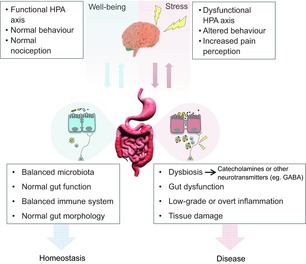Figure 1. The microbiota–gut–brain axis comprises the bidirectional communication, through multiple pathways, between the gut and the brain.

During stress, alterations at the level of the central nervous system can influence gut neuromotor and secretory function, immunity and microbiota composition. In turn, dysbiosis may contribute to perpetuate dysfunction and inflammation, further disrupting gut–brain communication. Some of these effects may be mediated by direct host–microbial interactions at the level of the intestinal epithelium, production of bacterial metabolites (cathecolamines, GABA, etc). The sequence of events can occur in a top-to-bottom or bottom-to-top fashion, but once initiated can perpetuate and exacerbate maladaptive responses that promote a state of disease. We acknowledge dreamdesign and cooldesign (http://FreeDigitalPhotos.net) for the image of the gut and brain, respectively.
